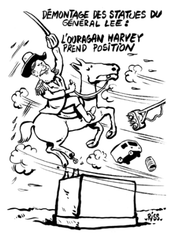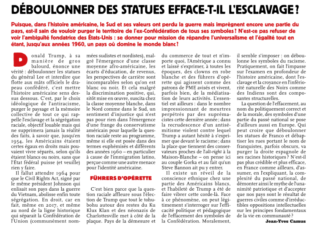If you haven't seen it:

"Dieu Existe !
Il a noyé tous les néo nazis du Texas !"
("God exists!
He drowned all the Neo Nazis of Texas!")
Unfortunately, none of the stories I could find contextualised or explained the cover, instead taking it at face value. One would imagine that calling it a "satirical" newspaper would clue journalists in to the fact that all might not be as it seemed, and not to take the cover at face value.
Yet, none dug or thought deeper, instead settling for varying degrees of condemnation (and roughly equal degrees of cluelessness).
For example, Newsweek wrote:
This week, its cover rejoices in the supposed death of neo-Nazis during a catastrophic natural disaster. The cartoon looks like a mishmash of American news, pairing the recent white nationalist and neo-Nazi demonstrations in Charlottesville, Virginia, with the hurricane.
However, there is no evidence thus far that any of the storm’s victims were neo-Nazis. Houston, which has a large Jewish community, is the fourth-largest city in the country and tends to lean toward the liberal side of the political spectrum. Though Texas went to Donald Trump during the 2016 election, Harris County voted for Hillary Clinton—54 percent to 41.6 percent.
Of course this is not a new phenomenon - in the response to the January 2015 attacks on Charlie Hebdo, I only managed to find two articles which thought deeper about Charlie Hebdo's satire, and only two(on the Daily Kos and the New Statesman) which really explained it (Vox was at least thoughtful, but didn't really explain the point of Charlie Hebdo's satire).
(Admittedly, I only looked at English language sources, but I doubt Francophone sources would bother explaining it - in French - to a Francophone audience, who would presumably be familiar with the conventions of French satire in general and Charlie Hebdo in particular)
When I first saw Charlie Hebdo's Hurricane Harvey cover, I thought it was quite funny and that it was quite obvious that they were poking fun at people who see (Neo) Nazis everywhere, and those who claim the American South is full of racists and white supremacists. I also thought that this was one of their more obvious piss-takes.
Luckily, you don't have to take my word for it. Consider two pieces of content that I will adduce, both from the same issue of Charlie Hebdo (1310) (yes, I was sufficiently irritated - not least by some idiot who didn't understand the concept of satire - that I shelled out US$2.97 for the issue).
Exhibit A: Cartoon

"Démontage des statues du Général Lee : L'ouragan Harvey prend position"
("Taking down of the statues of General [Robert E] Lee: Hurricane Harvey takes a stand")
Interpretation of this cartoon is more complicated than for the cover, but two points come readily to mind:
- The obsession with taking down Civil War statues is silly in the face of bigger concerns like Hurricane Harvey
- The politicisation of natural disasters like Hurricane Harvey is absurd and in bad taste
Exhibit B: Article

(as the article is quite long I will publish the translation here and the original French text below)
DOES TEARING DOWN STATUES ERASE SLAVERY?
Because, in American history, the South and its values lost the war but still permeate a part of the country, is it healthy to want to purge the lands of the ex-Confederation of all its symbols? Doesn't this refuse to acknowledge the foundational contradiction of the United States: giving itself the mission of spreading universalism and equality while being, until the 1960s, a country controlled by white people?
Donald Trump, in his oafish way, speaks a truth: tearing down statues of General [Robert E] Lee and banning the flying of the Confederate Flag by governments is getting American history wrong. Following the dictates of the ideology of antiracism and purging the countryside of the collective memory of everything that brings to mind slavery and racial segregation might be a laudable aim but it will never erase the reality that, until 1954, Americans were certainly equal in rights but could live separate lives, depending on whether they were white or black, and the federal government couldn't (and didn't want to) do anything.
It was only until 1964 that the Civil Rights Act, signed by the same President Johnson who got his country stuck in the Vietnam War, finally abolished segregation totally. According to the law, because actually, even in 2017, and even north of the historic line which separated the Confederation and the Union (commonly called the South and the North), despite the emergence of an African-American middle class, gaps in education, income, and career opportunities are different depending on whether one is black or white. And this despite positive discrimination which, once implemented, engendered in the white middle class, in the North as well as the South, a feeling of injustice which fueled the emergence of a conservative American fringe for which the the racial question remains on the programme, even if it's phrased in euphemistic terms and is different from that of the 1960s - in particularly due to Latino immigration, seen as another threat to American identity.
Führers of the Operetta [Ed: An operetta is a comic opera. Perhaps this might better be translated as Hitler wannabes]
Well, the racial question underlying the election of Trump and all the hubbub around the remnants of the Ku Klux Klan and the Neo Nazis of Charlottesville is besides the point. A country of excess and trade in anything and everything, America has seen and allowed to be expressed, in all ages, clowns in white robes and Hitler wannabes who act like the informed bosses of SMEs (small and medium enterprises) and live for the media coverage of their activities. The key thing goes beyond that: in the high number of deaths caused by supremacists last year, in the upsurge in anti-Semitic violence against which Trump was as hesitant in addressing as he was with racism, and in the place which Conservatives close to the Alt-Right have in the White House - one thinks here of the Gorkas and Steve Bannon could also be placed here.
There has been an awakening of racial consciousness among a portion of white Americans, and Trump's skill in stoking this sentiment. In the face of this phenomenon, one can legitimately question the political and pedagogic effectiveness of removing symbols of the Confederation. Morally, it would seem obligatory: one takes down the symbols of racism. Practically, one avoids examining the profoundness of slavery and how the belief in the natural inferiority of blacks and Indians are structural components.
The question of taking down, in the name of political correctness and morality, symbols of a part of national history is being asked elsewhere in Europe. Who thinks that taking down statues of Franco or renaming streets having the names of sometimes obscure Francoists will purge the Spanish Right of its historic rutes? Isn't it more credible and effective, in France and elsewhere, to take on the task of dismantling the myth of patriotic unanimity by explaining the complexity of national history and accepting that our countries are the result of civil wars as irreducible intellectual oppositions on top of the fundamental principles of community living?
Jean-Yves Camus
As this article is non-satirical I trust that its points are self-evident.
So yes, Charlie Hebdo was calling Hurricane Harvey victims (Neo) Nazis as much as Jonathan Swift said the Irish should eat their children.
Original French text of Charlie Hebdo article:
DÉBOULONNER DES STATUES EFFACE-T-IL L'ESCLLAVAGE ?
Puisque, dans l'histoire américaine, le Sud et ses valeurs ont perdu la guerre mais imprègnent encore une partie du pays, est-il sain de vouloir purger le territoire de l'ex-Confédération de tous ses symboles ? N'est-ce pas refuser de voir l'ambiguïté fondatrice des États-Unis : se donner pour mission de répandre l'universalisme et l'égalité tout en étant, jusqu'aux années 1960, un pays où domine le monde blanc ?
Donald Trump, à sa maniere de gros balourd, énonce une vérité : déboulonner les statues du général Lee et interdire que flotte aux mâts officiels le drapeau confédéré, c'est mettre l'histoire américaine sens dessus dessous. C'est, par le choix idéologique de l'antiracisme, purger le paysage et la memoire collective de tout ce qui rappelle l'esclavage et la ségrégation raciale, objectif louable mais qui ne supprimera jamais la réalité des faits, à savoir que, jusqu'en 1954, les Américains etaient certes égaux en droits mais pouvaient vivre séparés, selon qu'ils étaient blancs ou noirs, sans que l'État fédéral puisse (et veuille) rien y faire.
Il fallut attendre 1964 pour que le Civil Rights Act, signé par le même président Johnson qui enlisait son pays dans la guerre du Vietnam, abolisse enfin toute ségrégation. En droit, car en fait, même en 2017, et même au nord de la ligne historique qui séparait la Confédération de l'Union (communément nommés sudistes et nordistes), malgré l'émergence d'une classe moyenne afro-américaine, les écarts d'éducation, de revenus, les perspectives de carrière sont incomparables selon qu'on est blanc ou noir. Et cela malgré la discrimination positive, qui, sitôt mise en oeuvre, suscila chez la classe moyenne blanche, dans le Nord comme dans le Sud, un sentiment d'injustice qui n'est pas pour rien dans l'émergence d'une frange du conservatisme américain pour laquelle la question raciale reste au programme, même si elle est posée dans des termes euphémisés et différents des annees 1960 - en particulier à cause de l'immigration latino, perçue comme une autre menace pour l'identité américaine.
Führers D'Opérette
C'est bien parce que la question raciale affleure sous l'éléction de Trump que tout le tohubohu autour des restes du Ku Klux Klan et des néonazis de Charlottesville met à cote de la plaque. Pays de la démesure et du commerce de tout et n'importe quoi, l'Amérique a connu et laissé s'exprimer, à toutes les époques, des clowns en robe blanche et des führers d'opérette qui agissent comme des patrons de PME avisés et vivent, parfois bien, de la médiatisation de leurs activités. L'essentiel est ailleurs : dans le nombre impressionnant de meurtres perpétrés par des suprémacistes cette dernière année ; dans la recrudescence d'un antisémitisme violent contre lequel Trump a autant hésité à s'exprimer que devant le racisme; dans la place que tiennent des Conservateurs proches de l'alt-right à la Maison-Blanche - on pense ici au couple Gorka et au fait qu'un Steve Bannon ait pu y entrer.
Il existe un réveil de la conscience ethnique chez une partie des Américains blancs, et l'habileté de Trump a été de faire vibrer cette corde-là. Face à ce phénomène, on peut légitimement s'interroger sur l'efficacité politique et pédagogique de l'effacement des symboles de la Confédération. Moralement, il semble s'imposer : on déboulonne les symboles du racisme. Pratiquement, on fait l'impasse sur l'examen en profondeur de l'esclavage et la croyance en l'infériorité naturelle des Noirs comme des Indiens sont des composantes structurelles.
La question de l'effacement, au nom du politiquement correct et de la morale, des symboles d'une partie du passé national se pose d'ailleurs aussi en Europe. Qui peut croire que déboulonner les statues de Franco et débaptiser les rues portant le nom de franquistes, parfois obscurs, va purger la droite espagnole de ses racines historiques? N'est-il pas plus crédible et plus efficace, en France comme ailleurs, d'assumer, en l'expliquant, la complexité du passé national, de démonter ainsi le mythe de l'unanimité patriotique et d'accepter que nos pays sont le résultat de guerres civiles comme d'irréductibles oppositions intellectuelles sur les principes fondamentaux de la vie en communauté ?
Jean-Yves Camus


